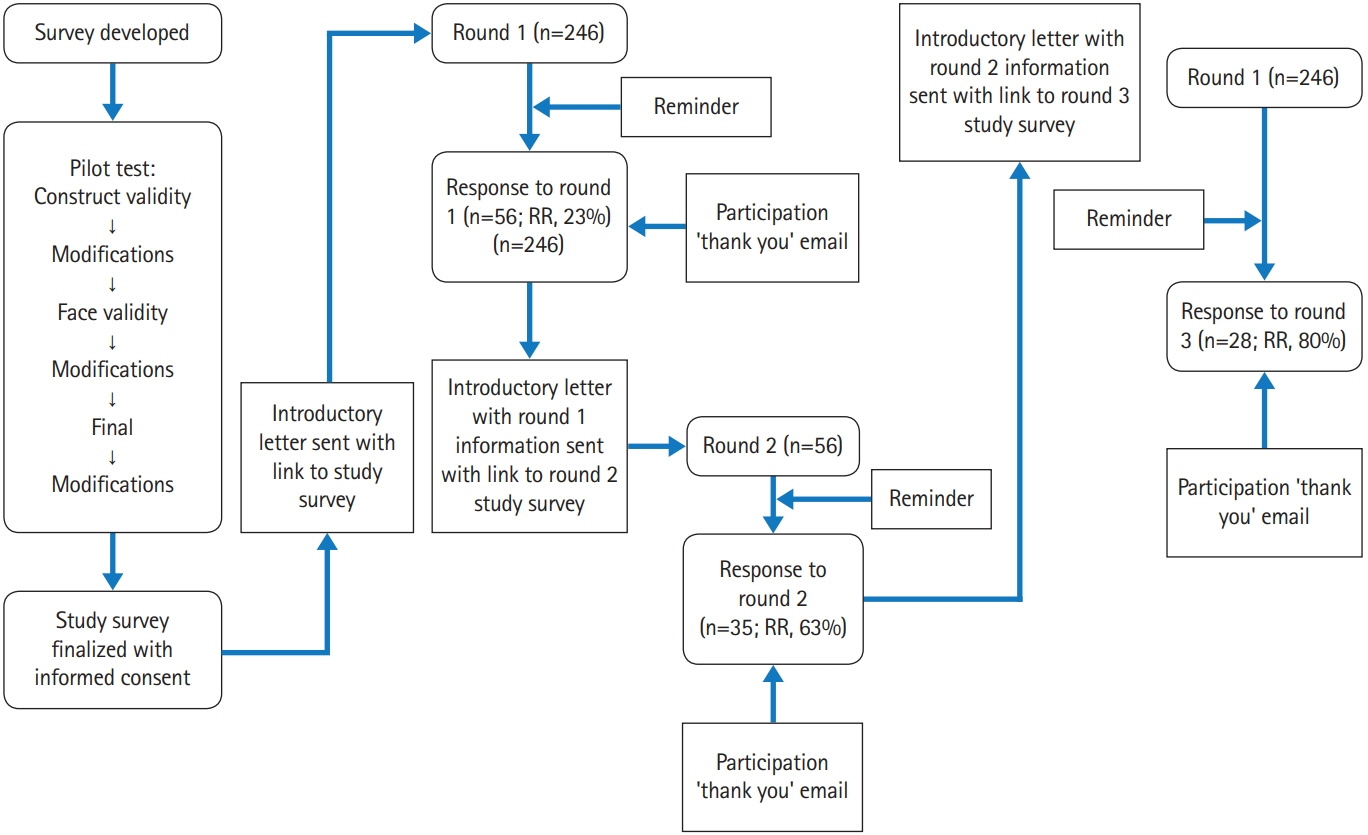J Educ Eval Health Prof.
2019;16:24. 10.3352/jeehp.2019.16.24.
Mismatch between the proposed ability concepts of the Graduate Record Examination and the critical thinking skills of physical therapy applicants suggested by an expert panel in the United States
- Affiliations
-
- 1Department of Physical Therapy, College of Health Professions, University of Tennessee Health Science Center, Memphis, TN, USA
- KMID: 2502175
- DOI: http://doi.org/10.3352/jeehp.2019.16.24
Abstract
- Purpose
The Graduate Record Examination (GRE) is a general examination predictive of success in US-based graduate programs. Used to assess students’ written, mathematical, and critical thinking (CT) skills, the GRE is utilized for admission to approximately 85% of US physical therapist education (PTE) programs. The purpose of this study was to assess whether the CT skills measured by the GRE match those deemed by an expert panel as the most important to assess for PTE program acceptance.
Methods
Using a modified E-Delphi approach, a 3-phase survey was distributed over 8 weeks to a panel consisting of licensed US physical therapists with expertise on CT and PTE program directors. The CT skills isolated by the expert panel, based on Facione’s Delphi report, were compared to the CT skills assessed by the GRE.
Results
The CT skills supported by the Delphi report and chosen by the expert panel for assessment prior to acceptance into US PTE programs included clarifying meaning, categorization, and analyzing arguments. Only clarifying meaning matched the CT skills from the GRE.
Conclusion
The GRE is a test for general admission to graduate programs, lacking context related to healthcare or physical therapy. The current study fails to support the GRE as an assessment tool of CT for admission to PTE programs. A context-based admission test evaluating the CT skills identified in this study should be developed for use in the admission process to predict which students will complete US PTE programs and pass the licensure exam.
Keyword
Figure
Cited by 1 articles
-
Correlation between physician assistant students’ performance score of history taking and physical exam documentation and scores of Graduate Record Examination, clinical year grade point average, and score of Physician Assistant National Certifying Exam in the United States
Sara Lolar, Jamie McQueen, Sara Maher, Sun Huh
J Educ Eval Health Prof. 2020;17:16. doi: 10.3352/jeehp.2020.17.16.
Reference
-
References
1. Facione PA. Critical thinking: a statement of expert consensus for purposes of educational assessment and instruction: research findings and recommendations. Millbrae (CA): California Academic Press;1990.2. Commission on Accreditation in Physical Therapy Education. Aggregate program data: 2014-15 physical therapist education programs fact sheets. Alexandria (VA): Commission on Accreditation in Physical Therapy Education;2015.3. Huhn K, Black L, Jensen GM, Deutsch JE. Tracking change in critical-thinking skills. J Phys Ther Educ. 2013; 27:26–31.
Article4. Educational Testing Service. About the GRE revised general test [Internet]. Princeton (NJ): Educational Testing Service;2016. [cited 2016 Feb 6]. Available from: https://www.ets.org/gre/revised_general/about/?WT.ac=grehome_greabout_b_150213.5. Patton MQ. Qualitative research and evaluation methods: integrating theory and practice. Thousand Oakes (CA): Sage Publications;2015.6. Hasson F, Keeney S. Enhancing rigour in the Delphi technique research. Technol Forecast Soc Chang. 2011; 78:1695–1704. https://doi.org/10.1016/j.techfore.2011.04.005.
Article7. Holloway K. Doing the E-Delphi: using online survey tools. Comput Inform Nurs. 2012; 30:347–350. https://doi.org/10.1097/NXN.0b013e31825e8923.
Article8. Litwin MS. How to measure survey reliability and validity. Thousand Oaks (CA): Sage Publications;1995.9. Keeney S, Hasson F, McKenna H. Consulting the oracle: ten lessons from using the Delphi technique in nursing research. J Adv Nurs. 2006; 53:205–212. https://doi.org/10.1111/j.1365-2648.2006.03716.x.
Article10. Day J, Bobeva M. A generic toolkit for the successful management of Delphi studies. Electron J Bus Res Methodol. 2005; 3:103–116.11. Duffield C. The Delphi technique: a comparison of results obtained using two expert panels. Int J Nurs Stud. 1993; 30:227–237. https://doi.org/10.1016/0020-7489(93)90033-q.
Article12. Higgs J, Jones M, Loftus S, Christensen N. Clinical reasoning in the health professions. Philadelphia (PA): Elsevier Health Sciences;2008.13. Simpson E, Courtney M. Critical thinking in nursing education: literature review. Int J Nurs Pract. 2002; 8:89–98. https://doi.org/10.1046/j.1440-172x.2002.00340.x.
Article14. Brudvig TJ, Dirkes A, Dutta P, Rane K. Critical thinking skills in health care professional students: a systematic review. J Phys Ther Educ. 2013; 27:12–25. https://doi.org/10.1097/00001416-201307000-00004.
Article15. Domenech MA, Watkins P. Critical thinking and disposition toward critical thinking among physical therapy students. J Allied Health. 2015; 44:195–200.16. Suckow DW, Brahler CJ, Donahoe-Fillmore B, Fisher MI, Anloague PA. The association between critical thinking and scholastic aptitude on first-time pass rate of the national physical therapy examination. J Stud Phys Ther Res. 2015; 8:71–77.17. Insight Assessment. Critical thinking solutions [Internet]. San Jose (CA): Insight Assessment;2019. [cited 2019 Jul 21]. Available from: https://www.insightassessment.com/.18. PSI. The Watson-Glaser II: the revised version of the Watson Glaser critical thinking appraisal [Internet]. Glendale (CA): 2019. [cited 2019 Jul 21]. Available from: https://www.psionline.com/assessments/watson-glaser-critical-thinking-appraisal/.
- Full Text Links
- Actions
-
Cited
- CITED
-
- Close
- Share
- Similar articles
-
- Using a virtual flipped classroom model to promote critical thinking in online graduate courses in the United States: a case presentation
- Effectiveness of pre-admission data and letters of recommendation to predict students who will need professional behavior intervention during clinical rotations in the United States
- Critical Thinking and the Standards of Nursing Education
- Physical therapy students’ perception of their ability of clinical and clinical decision-making skills enhanced after simulation-based learning courses in the United States: a repeated measures design
- Effects of Critical Thinking and Communication Skills on the Problem-Solving Ability of Dental Hygiene Students


